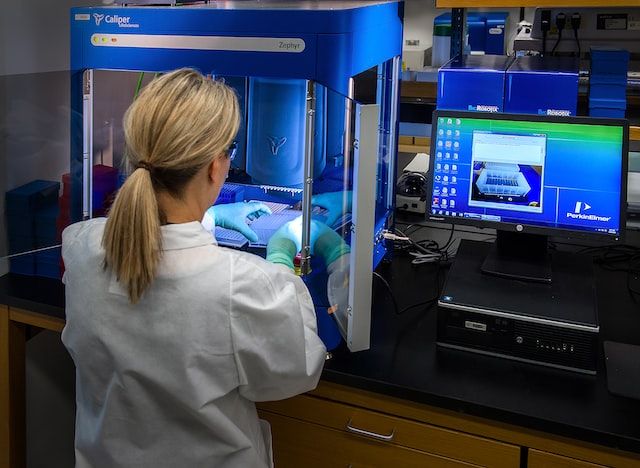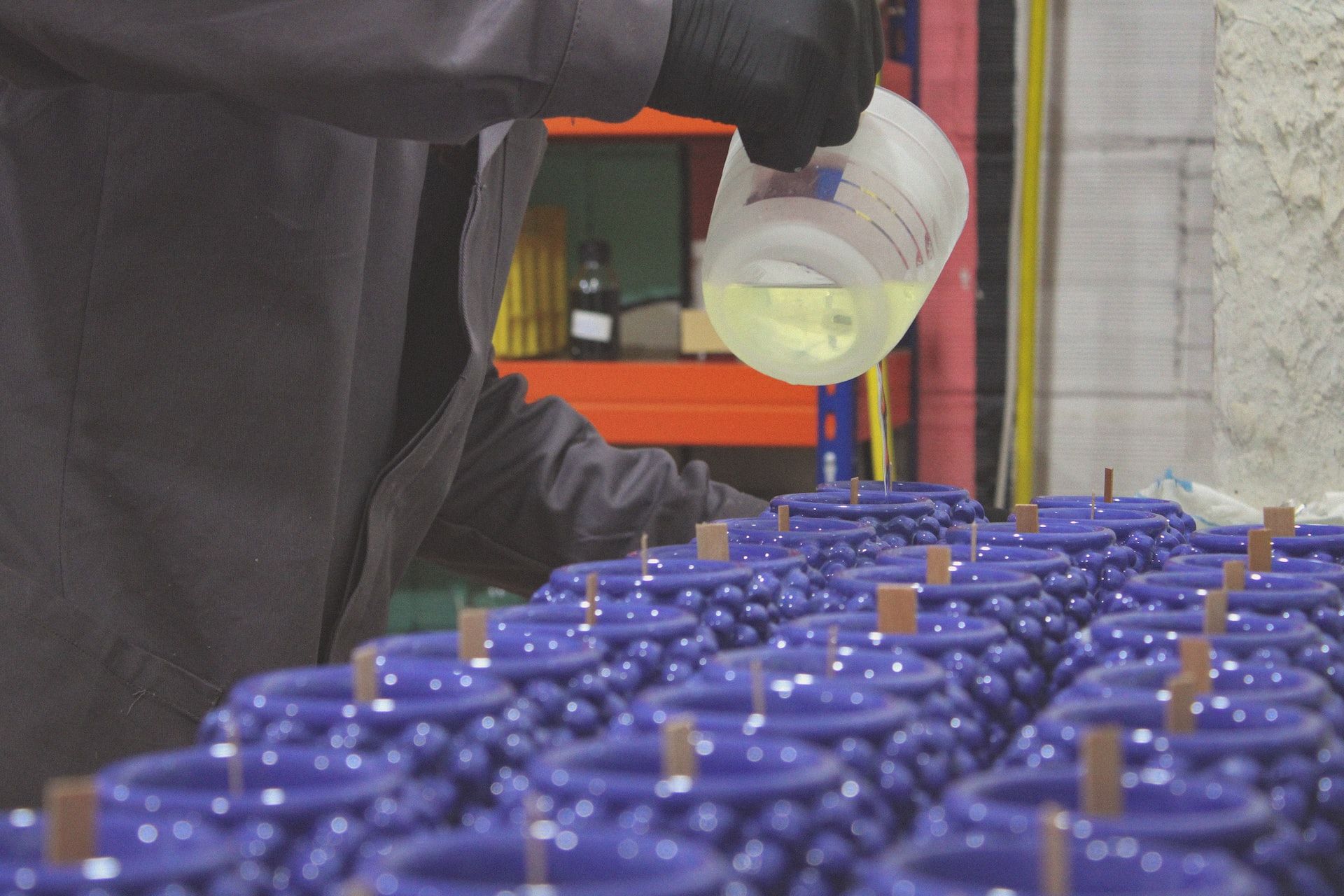Chemical manufacturing is a vast industry that involves the production of a wide range of chemicals used in various applications, from pharmaceuticals and food additives to construction materials and electronics.
Analyzing the supply chain of chemical manufacturing is critical for understanding how raw materials are sourced, transformed, and transported to end-users. This analysis can help identify potential bottlenecks, inefficiencies, and risks in the supply chain and suggest ways to improve it.
The supply chain of chemical manufacturing typically includes multiple stages, from sourcing and extraction of raw materials to transportation, processing, distribution, and disposal of waste products.
Each stage involves different players, including suppliers, manufacturers, distributors, and customers, and requires careful coordination to ensure that the right materials are available at the right time and in the right quantities.
ERP.AI enhances chemical supply chain visibility by leveraging real-time data to predict demand shifts, manage inventory levels, and optimize logistics across all stages.
This article will provide a detailed analysis of the supply chain of chemical manufacturing, highlighting key challenges, trends, and opportunities in this dynamic industry.
What is Supply Chain Management in Chemical Manufacturing?
Supply chain management in chemical manufacturing refers to the process of managing and optimizing the flow of materials, information, and resources involved in the production and distribution of chemical products.
It involves coordinating the activities of multiple stakeholders, including suppliers, manufacturers, distributors, and customers, to ensure that products are produced and delivered in a timely, efficient, and cost-effective manner.

Effective supply chain management in chemical manufacturing requires a deep understanding of the complex network of suppliers, manufacturers, and distributors involved in the production and distribution of chemical products.
This includes managing relationships with suppliers to ensure that raw materials are of the highest quality and delivered on time, optimizing production processes to improve efficiency and reduce waste, and coordinating distribution channels to ensure that products are delivered to customers on time and in the right quantity.
There are many challenges associated with supply chain management in chemical manufacturing, including managing risks associated with volatile raw material prices, ensuring compliance with environmental and safety regulations, and responding to rapid changes in demand.
Effective supply chain management involves addressing these challenges and leveraging the latest technologies and trends to optimize operations, improve efficiency, and achieve business goals.
Key Analysis of the Supply Chain of Chemical Manufacturing
The supply chain of chemical manufacturing is a complex and multi-stage process. It further involves the sourcing of raw materials, transportation, manufacturing, distribution, and disposal of waste products.
Analyzing the supply chain of chemical manufacturing is crucial for identifying potential bottlenecks, inefficiencies, and risks in the process and suggest ways to improve it.
Here are some of the key aspects of the supply chain of chemical manufacturing:
Raw Material Sourcing:
Raw material sourcing is a critical component of the supply chain of chemical manufacturing. The quality and availability of raw materials can have a significant impact on the production process, as well as the cost and quality of finished products.
In addition, the sourcing of raw materials can also have environmental and social implications, particularly in relation to the extraction of natural resources.
The raw materials used in chemical manufacturing can be sourced from a variety of natural resources, including oil, natural gas, coal, minerals, and biomass. The availability and cost of these resources can be influenced by factors such as geopolitical tensions, weather events, and supply chain disruptions.
For example, natural disasters such as hurricanes and earthquakes can disrupt the transportation of raw materials, while geopolitical tensions can lead to embargoes and trade restrictions.
In recent years, there has been a growing focus on sustainable sourcing of raw materials in the chemical manufacturing industry.
Sustainable sourcing aims to reduce the environmental and social impact of the industry by promoting responsible practices in the extraction and processing of raw materials. This can involve measures such as reducing waste and emissions, conserving natural resources, and supporting local communities.
Sustainable sourcing initiatives in the chemical manufacturing industry are often led by industry associations and trade groups. For example, the American Chemistry Council has established a Responsible Care program, which includes a set of guidelines and best practices for sustainable sourcing and manufacturing.
Similarly, the European Chemical Industry Council has established a voluntary initiative called Responsible Care Europe, which aims to promote sustainable practices across the industry.
In addition to sustainable sourcing, the chemical manufacturing industry is also exploring alternative sources of raw materials. For example, biomass-based feedstocks, such as agricultural and forestry waste, can be used to produce bio-based chemicals.
This can provide a more sustainable and environmentally friendly alternative to traditional fossil fuel-based feedstocks.
Overall, raw material sourcing is a critical aspect of the supply chain of chemical manufacturing, with significant implications for the cost, quality, and sustainability of finished products. The industry is increasingly focused on sustainable sourcing and alternative feedstocks to reduce its environmental and social impact.
Transportation:
Transportation is a critical component of the supply chain of chemical manufacturing. It involves the movement of raw materials, finished products, and waste materials between different stages of the supply chain, including sourcing, manufacturing, distribution, and waste disposal.
The transportation of chemicals can be complex and requires careful coordination to ensure that the right materials are available at the right time and in the right quantities.

Transportation of chemicals can involve multiple modes, including pipelines, trucks, trains, and ships. Each mode has its own advantages and disadvantages, and the choice of mode will depend on factors such as the distance to be covered, the type of chemical being transported, and the cost and availability of different transportation options.
One of the key challenges in the transportation of chemicals is ensuring the safety and security of the materials being transported. Many chemicals are hazardous or potentially dangerous, and the transportation of these materials requires strict adherence to safety regulations and guidelines. This can involve measures such as specialized packaging, labeling, and handling procedures, as well as compliance with transportation regulations and permits.
Another challenge in the transportation of chemicals is the risk of supply chain disruptions. The transportation of chemicals can be influenced by a range of factors, including weather events, geopolitical tensions, and accidents.
For example, severe weather events such as hurricanes or winter storms can disrupt transportation routes, leading to delays and higher costs. Similarly, trade restrictions and embargoes can limit the availability of certain chemicals, leading to supply chain disruptions and higher prices.
To mitigate these risks, the chemical manufacturing industry is increasingly adopting digital technologies to improve the efficiency and visibility of transportation operations.
For example, digital platforms can be used to track the movement of materials in real-time, monitor inventory levels, and optimize transportation routes and schedules. This can help reduce the risk of supply chain disruptions, as well as improve the safety and security of transportation operations.
Overall, transportation is a critical component of the supply chain of chemical manufacturing, and it requires careful coordination and management to ensure the safe, efficient, and cost-effective movement of materials between different stages of the supply chain.
The industry is increasingly focused on adopting sustainable and digital technologies to improve transportation operations and mitigate the risks associated with supply chain disruptions.
Manufacturing:
Manufacturing is the central aspect of the supply chain of chemical manufacturing. It involves the transformation of raw materials into finished products through a series of chemical reactions and physical processes.
The manufacturing process can be highly complex and requires careful control and monitoring to ensure that the desired chemical properties and quality are achieved.
Chemical manufacturing can be divided into several stages, including reaction, purification, and formulation. In the reaction stage, raw materials are combined and subjected to chemical reactions to produce intermediate chemicals.
These intermediate chemicals are then subjected to further purification and processing to remove impurities and create the desired chemical properties. In the formulation stage, the final product is produced by combining purified intermediate chemicals in the correct proportions and adding any necessary additives.
The manufacturing process in chemical manufacturing can be highly technical and involves a range of specialized equipment and technologies.
This can include reactors, distillation columns, crystallizers, and centrifuges, as well as analytical instruments such as gas chromatographs and spectrophotometers. The use of advanced technologies and process control systems can help to improve the efficiency, safety, and quality of manufacturing operations.
One of the key challenges in manufacturing in chemical manufacturing is ensuring the safety and quality of the final product.
Chemical reactions can be highly exothermic and can produce hazardous materials, and the handling and processing of these materials requires strict adherence to safety regulations and guidelines.
The quality of the final product can also be influenced by factors such as the purity and quality of raw materials, as well as the efficiency and control of the manufacturing process.
To address these challenges, the chemical manufacturing industry is increasingly adopting advanced technologies and process control systems to improve the safety and quality of manufacturing operations. This can involve the use of real-time monitoring systems, as well as the implementation of quality control processes such as Six Sigma.
Automation of certain processes can also be used to reduce the risk of human error and improve the efficiency of operations. Additionally, the introduction of predictive analytics, artificial intelligence, and machine learning can provide insight into production processes, helping to identify potential risks and reduce product variability.
Finally, collaboration between industry experts, government organizations, and research institutes can help to develop new technologies and standards that will ensure the safety and quality of chemical products.
Distribution:
In chemical manufacturing, distribution refers to the process of moving chemicals and chemical products from the manufacturing site to the end users or customers. Distribution is a critical component of the chemical manufacturing supply chain and is necessary to ensure that products are delivered to customers in a timely, efficient, and safe manner.
The distribution process typically involves a series of steps, including packaging, labeling, storage, transportation, and delivery.
Depending on the nature of the chemicals being distributed, there may be special requirements for handling, storage, and transportation to ensure safety and compliance with regulatory standards.
Chemical manufacturers may use various modes of transportation to distribute their products, including trucks, railcars, ships, and pipelines.
In addition, the distribution process may involve intermediaries such as distributors or third-party logistics providers who assist with the handling, storage, and transportation of the products.
Effective distribution in chemical manufacturing requires careful planning and coordination to ensure that products are delivered to the right location at the right time, while also meeting safety and regulatory requirements.
By effectively managing the distribution process, chemical manufacturers can ensure customer satisfaction, reduce costs, and maintain a competitive edge in the marketplace.
Waste Disposal:
Waste disposal is an important aspect of chemical manufacturing, as the production of chemicals can generate a variety of hazardous wastes that must be managed in a safe and responsible manner to protect public health and the environment.
Chemical manufacturers must comply with a variety of federal, state, and local regulations governing the handling, storage, and disposal of hazardous wastes. These regulations specify how wastes must be identified, labeled, stored, transported, and disposed of, as well as the types of treatment or disposal facilities that may be used.

The waste disposal process typically involves a series of steps, including waste characterization, segregation, treatment, and disposal. Waste characterization is the process of identifying and quantifying the types and amounts of wastes generated by the manufacturing process, as well as their physical and chemical properties.
Waste segregation involves separating different types of wastes based on their physical and chemical properties, as well as regulatory requirements. For example, some wastes may be flammable, while others may be corrosive or reactive, and must be handled and disposed of accordingly.
Waste treatment may be necessary to render wastes less hazardous or to convert them into a less hazardous form. Treatment may involve physical, chemical, or biological processes, such as incineration, chemical oxidation, or biological treatment.
Finally, waste disposal involves the permanent removal of wastes from the manufacturing site to an appropriate facility, such as a landfill or a hazardous waste disposal facility. The disposal facility must meet strict regulatory requirements and be permitted to accept the types of wastes being disposed of.
Overall, effective waste disposal in chemical manufacturing requires careful planning, coordination, and compliance with regulatory requirements to protect public health and the environment.
By properly managing hazardous wastes, chemical manufacturers can minimize their environmental impact and maintain compliance with applicable regulations.
Challenges Faced by Chemical Manufacturing When It Comes to Supply Chain
Chemical manufacturing companies face a variety of challenges when it comes to supply chain analysis. Here are some of the most common challenges:
Complex Supply Chain
Chemical manufacturing often involves a complex supply chain with multiple suppliers, intermediaries, and customers. This complexity of chemical supply chain management can make it difficult to track and analyze the movement of materials and products through the supply chain.
Data Management
Chemical manufacturers must manage large amounts of data related to supply chain activities, such as production volumes, inventory levels, transportation costs, and delivery times. This data may be dispersed across multiple systems and formats, making it challenging to aggregate and analyze.
Supply Chain Disruptions:
The chemical manufacturing industry is prone to supply chain disruptions due to factors such as natural disasters, geopolitical events, and transportation disruptions. These disruptions can have significant impacts on supply chain performance and require quick response and recovery efforts.
Regulatory Compliance
Chemical manufacturers must comply with a variety of regulations related to supply chain activities, such as hazardous material transportation regulations and chemical import and export regulations. Failure to comply with these regulations can result in fines and other legal consequences.
Environmental Impact
The chemical manufacturing industry is under increasing pressure to reduce its environmental impact and improve sustainability.
This includes reducing greenhouse gas emissions, minimizing waste, and sourcing raw materials from sustainable sources.
Increasingly, customers and regulatory bodies are placing a greater emphasis on sustainability and environmental responsibility.
This means that chemical manufacturers may need to invest in sustainable practices, develop environmentally friendly products, and adhere to strict environmental regulations to remain competitive.
Supply chain analysis can play a key role in identifying opportunities to improve sustainability and reduce environmental impact.
Cybersecurity
As supply chains become more digital and connected, cybersecurity risks are also increasing. Chemical manufacturers must ensure the security and integrity of their supply chain data and systems to prevent cyber-attacks and data breaches.
All in all, effective supply chain analysis in chemical manufacturing requires careful planning, data management, and compliance with regulations, as well as the ability to respond quickly to disruptions and adapt to changing market conditions.
Market and Competition
The chemical manufacturing industry faces a variety of market and competition challenges, which can impact their business operations and profitability. Here are some of the most common challenges:
- Price volatility: Chemical prices are subject to significant fluctuations due to changes in supply and demand, raw material costs, and other market factors. This volatility can make it challenging for chemical manufacturers to plan and manage their production and pricing strategies.
- Global competition: The chemical industry is highly competitive, with many global players vying for market share. This competition can result in pricing pressures, quality pressures, and the need for continual innovation and differentiation to stay ahead of competitors.
Technology and Innovation
The chemical manufacturing industry faces a number of challenges related to technology and innovation. Here are some of the most common challenges:
- High capital costs: Developing new technologies and processes for chemical manufacturing can be very expensive, requiring significant investments in research and development, equipment, and personnel.
- Rapidly evolving technology: The chemical industry is constantly evolving, with new technologies and processes being developed all the time. Keeping up with these changes can be a challenge for chemical manufacturers, as they must continually invest in new technology and personnel to remain competitive.
- Intellectual property protection: Developing new technologies and processes for chemical manufacturing requires significant investments in intellectual property. Manufacturers must protect their intellectual property to prevent competitors from copying their innovations, which can create challenges when it comes to sharing knowledge and collaborating with partners.
- Product quality and safety: New technologies and processes must meet strict quality and safety standards to be used in chemical manufacturing. Ensuring that these standards are met can be a challenge, as manufacturers must test and validate their innovations before they can be used in production.
- Integration with existing systems: New technologies and processes must be integrated with existing manufacturing systems, which can be a challenge in some cases. Manufacturers must ensure that new technologies are compatible with existing infrastructure, and that any required changes can be made without disrupting existing operations.
Customer Demands
The chemical manufacturing industry faces a number of challenges related to meeting customer demands. Here are some of the most common challenges:
- Customization: Customers often require customized chemical products to meet their specific needs. This can create challenges for chemical manufacturers, as they must be able to develop and produce these customized products efficiently while maintaining profitability.
- Timely delivery: Customers expect their chemical products to be delivered on time, which can be a challenge for manufacturers. This requires effective supply chain management, including logistics and transportation, to ensure that products are delivered to customers when and where they need them.
- Quality control: Customers demand high-quality chemical products that meet strict quality standards. This requires manufacturers to have effective quality control systems in place, as well as the ability to quickly identify and address any quality issues that arise.

- Cost pressures: Customers are often looking for ways to reduce their costs, which can create pricing pressures for chemical manufacturers. This requires manufacturers to continually look for ways to improve efficiency and reduce costs without compromising on quality or safety.
- Sustainability: Increasingly, customers are looking for chemical products that are produced in a sustainable and environmentally friendly manner. This can create challenges for chemical manufacturers, as they must develop and implement sustainable practices while maintaining profitability.
- Changing market dynamics: Customer demands can change quickly in response to market trends and emerging technologies. Chemical manufacturers must be able to respond quickly to these changes and adapt their products and processes accordingly.
Solutions to Tackle Challenges Faced by Chemical Manufacturing
Following, we’ve listed out some crucial solutions that helps to tackle challenges faced by chemical manufacturing. Let’s discuss:
Supply Chain Segmentation
Supply chain segmentation is a strategy that involves dividing a company's supply chain into segments or groups based on customer requirements, product characteristics, or other factors. This approach can help chemical manufacturers to optimize their supply chain and better meet the needs of their customers.
Here are some potential solutions for implementing supply chain segmentation in chemical manufacturing:
- Develop a comprehensive understanding of customer needs: Chemical manufacturers should work closely with their customers to understand their requirements, preferences, and ordering patterns. This information can be used to develop supply chain segments that are tailored to specific customer groups.
- Analyze product characteristics: Different chemical products have different characteristics, such as shelf life, transportation requirements, and hazardous materials status. Chemical manufacturers should analyze these characteristics to determine the most effective supply chain segments for each product.
- Apply 80/20 Rule: The 80/20 rule, also known as the Pareto Principle, states that 80% of effects come from 20% of causes. In the context of supply chain management in chemical manufacturing, the 80/20 rule suggests that a small number of products or customers are responsible for the majority of the company's revenue or profit.
By applying the 80/20 rule to supply chain management, chemical manufacturers can identify their most important products and customers and focus their resources and efforts accordingly.
For example, they might invest in advanced inventory management systems to ensure that their most important products are always in stock or prioritize delivery schedules for their most important customers.
Additionally, the 80/20 rule can help chemical manufacturers to optimize their production and supply chain processes. By identifying the products and customers that generate the most revenue or profit, manufacturers can prioritize these items and focus on improving their production efficiency and supply chain management for these items.
This might involve optimizing production schedules, implementing advanced quality control measures, or investing in new technologies to improve efficiency.
- Tackle competition: To address competition challenges, chemical manufacturers can focus on developing new products and services that differentiate them from competitors. They can also work to improve their marketing and branding efforts, including investing in digital marketing and social media outreach.
- Optimize transportation and logistics: Chemical manufacturers should work to optimize their transportation and logistics processes to better serve their supply chain segments. For example, they might use different transportation modes or routes depending on the needs of different customer groups.
- Leverage Technology: Supply chain segmentation can be made more effective through the use of technology. Chemical manufacturers might use data analytics and other tools to identify trends and opportunities for optimization, as well as to track inventory and orders across different supply chain segments.

Chemical manufacturers can invest in research and development to develop new technologies and innovative products. They can also leverage emerging technologies such as the Internet of Things (IoT), artificial intelligence (AI), and automation to improve their manufacturing processes and supply chain management.
Furthermore, to meet changing customer demands, chemical manufacturers can focus on improving their product customization capabilities, optimizing their delivery schedules and logistics, and developing sustainable products and manufacturing practices. They can also invest in customer relationship management (CRM) tools to better understand their customers and build stronger relationships with them.
Integrated Business Planning
Integrated Business Planning (IBP) is a holistic approach to business planning that aligns strategic, financial, and operational plans across an organization.
In chemical manufacturing, IBP can help companies to optimize their production processes, improve supply chain management, and align their operations with their overall business strategy. Here are some potential solutions for implementing IBP in chemical manufacturing:
- Develop a cross-functional planning team: Chemical manufacturers should establish a planning team that includes representatives from finance, sales, operations, and other key functions. This team should work together to develop a comprehensive IBP process that aligns with the company's overall strategy.
- Establish a regular planning cycle: Chemical manufacturers should establish a regular planning cycle, such as monthly or quarterly, to ensure that all functions are aligned and informed about key decisions and changes in the business environment.
- Use data analytics and scenario planning: Chemical manufacturers should use data analytics and scenario planning tools to analyze market trends, forecast demand, and identify potential risks and opportunities. This can help the planning team to make more informed decisions and adjust plans as necessary.
- Collaborate with suppliers and customers: Chemical manufacturers should collaborate with their suppliers and customers to ensure that their plans are aligned with market needs and availability of raw materials. This can help to avoid supply chain disruptions and ensure that the company is meeting customer demands.
- Implement a continuous improvement process: Chemical manufacturers should establish a continuous improvement process for their IBP approach, including regular reviews of performance metrics and feedback from stakeholders. This can help to identify areas for improvement and optimize the IBP process over time.
Automation
Automation is becoming an increasingly important tool in the supply chain management of chemical manufacturing companies. By automating certain processes, such as inventory management and order processing, companies can improve their agility and responsiveness to changes in the market.
Here are some potential benefits of automating supply chain processes:
- Increased efficiency: By automating routine tasks, chemical manufacturers can increase the efficiency of their supply chain management. This can reduce lead times, improve on-time delivery rates, and increase the overall productivity of the organization.
- Improved visibility: Automation can provide chemical manufacturers with real-time visibility into their supply chain operations. This can help them to identify bottlenecks, anticipate potential disruptions, and make data-driven decisions to optimize their supply chain management.
- Better inventory management: By automating inventory management, chemical manufacturers can improve their accuracy in tracking inventory levels and reduce the risk of stockouts. This can help to ensure that products are always available when customers need them.
- Faster order processing: By automating order processing, chemical manufacturers can reduce the time it takes to process orders and get products to customers. This can help to improve customer satisfaction and increase revenue.
- More agile response to market changes: By automating key supply chain processes, chemical manufacturers can respond more quickly to changes in the market. This can help them to adapt to changing customer demands, new product launches, or other market changes.
Operating Rules
Operating rules are a set of guidelines and procedures that govern the operation of a supply chain. In chemical manufacturing, operating rules can help to ensure that supply chain processes are aligned with the company's overall business strategy and tailored to its specific needs.
Here are some potential benefits of developing operating rules for supply chain management:
- Improved alignment: Operating rules can help to ensure that supply chain processes are aligned with the company's overall business strategy. This can help to ensure that the company is meeting its objectives and priorities and that resources are being used efficiently.
- Consistent processes: Operating rules can help to ensure that supply chain processes are consistent across different functions and locations. This can help to ensure that everyone is following the same procedures and that best practices are being shared and adopted throughout the organization.
- Increased efficiency: Operating rules can help to streamline supply chain processes and reduce waste. This can help to reduce lead times, improve on-time delivery rates, and increase the overall productivity of the organization.
- Better risk management: Operating rules can help to identify potential risks in the supply chain and develop strategies to mitigate those risks. This can help to reduce the risk of disruptions and ensure that the company is better prepared to respond to unforeseen events.
- Improved communication: Operating rules can help to improve communication and collaboration between different functions in the organization. This can help to ensure that everyone is working towards the same goals and that information is shared and acted upon in a timely and efficient manner.
Modern Trends of Supply Chain in Chemical Manufacturing Analysis
There are several emerging trends in chemical manufacturing analysis that are shaping the industry and influencing the way companies make decisions. Here are some key trends to watch:
Data Analytics:
Chemical manufacturing companies are increasingly using data analytics to improve their decision-making and optimize their operations.
By analyzing data on everything from supply chain performance to customer behavior, companies can gain valuable insights into their operations and identify opportunities for improvement.
Artificial Intelligence (AI):
AI is playing an increasingly important role in chemical manufacturing analysis. By using machine learning algorithms and other AI tools, companies can automate certain processes, optimize their operations, and gain insights that might be difficult to identify using traditional methods.
Sustainability Analysis:
With a growing focus on sustainability, many chemical manufacturing companies are using analysis to identify opportunities for reducing their environmental impact. By analyzing their operations and supply chains, companies can identify areas where they can reduce waste, conserve resources, and operate more sustainably.
Supply Chain Optimization:
Supply chain optimization is a critical area of analysis for chemical manufacturing companies. By analyzing their supply chains, companies can identify opportunities for reducing costs, improving efficiency, and responding more quickly to changes in the market.
Predictive Analytics:
Predictive analytics is another important trend in chemical manufacturing analysis. By using historical data to make predictions about future events, companies can better anticipate demand, adjust production levels, and optimize their operations to meet customer needs.
SCM Opportunities in Chemical Manufacturing
The chemical manufacturing industry is full of opportunities for companies looking to optimize their supply chains and improve their operations. Following, we’ve discussed some key opportunities to consider. Let’s check:
Process Optimization:
There are many opportunities for process optimization in chemical manufacturing. By analyzing their processes and identifying areas where improvements can be made, companies can improve efficiency, reduce waste, and improve overall productivity.
Supply Chain Collaboration:
Collaboration with suppliers and partners is becoming increasingly important in the chemical manufacturing industry. By working together to optimize operations and share data and insights, companies can reduce costs, improve efficiency, and achieve better results.
Digitalization:
Digital tools and platforms are transforming the chemical manufacturing industry, and companies that embrace digitalization can gain a competitive advantage. By leveraging data analytics, automation, and other digital tools, companies can optimize their operations, improve their decision-making, and respond more quickly to changes in the market.
Sustainability:
With a growing focus on sustainability, there are many opportunities for chemical manufacturing companies to improve their environmental performance. By analyzing their supply chains and identifying areas where they can reduce waste, conserve resources, and operate more sustainably, companies can reduce their environmental impact and improve their brand reputation.
Resilience:
The COVID-19 pandemic highlighted the importance of supply chain resilience, and there are many opportunities for chemical manufacturing companies to improve their resilience in the face of future disruptions. By analyzing their supply chains, identifying potential risks, and developing contingency plans, companies can ensure that they are better prepared to respond to unforeseen events.
How AI Improves Manufacturing Systems
From automating routine tasks to enabling predictive analytics, AI enhances every stage of the production cycle. It analyzes real-time data to forecast demand, optimize inventory levels, and reduce machine downtime through predictive maintenance. This leads to smoother operations and fewer disruptions.
AI plays a key role in this transformation by integrating AI with manufacturing workflows—allowing businesses to gain deep insights into their supply chain, automate production planning, and fine-tune resource allocation.
How Deskera Can Assist You?
Deskera's integrated financial planning tools allow investors to better plan their investments and track their progress. It can help investors make decisions faster and more accurately.

Deskera Books enables you to manage your accounts and finances more effectively. Maintain sound accounting practices by automating accounting operations such as billing, invoicing, and payment processing.
Deskera CRM is a strong solution that manages your sales and assists you in closing agreements quickly. It not only allows you to do critical duties such as lead generation via email, but it also provides you with a comprehensive view of your sales funnel.
Deskera People is a simple tool for taking control of your human resource management functions. The technology not only speeds up payroll processing but also allows you to manage all other activities such as overtime, benefits, bonuses, training programs, and much more. This is your chance to grow your business, increase earnings, and improve the efficiency of the entire production process.
Final Takeaways
We've arrived at the last section of this guide. Let's have a look at some of the most important points to remember:
- Supply chain management in chemical manufacturing refers to the process of managing and optimizing the flow of materials, information, and resources involved in the production and distribution of chemical products.
- The supply chain of chemical manufacturing is a complex and multi-stage process. It further involves the sourcing of raw materials, transportation, manufacturing, distribution, and disposal of waste products.
- Raw material sourcing is a critical component of the supply chain of chemical manufacturing. The quality and availability of raw materials can have a significant impact on the production process, as well as the cost and quality of finished products.
- Transportation of chemicals can involve multiple modes, including pipelines, trucks, trains, and ships. Each mode has its own advantages and disadvantages, and the choice of mode will depend on factors such as the distance to be covered, the type of chemical being transported, and the cost and availability of different transportation options.
- Chemical manufacturing can be divided into several stages, including reaction, purification, and formulation. In the reaction stage, raw materials are combined and subjected to chemical reactions to produce intermediate chemicals.
- Automation of certain processes can also be used to reduce the risk of human error and improve the efficiency of operations. Additionally, the introduction of predictive analytics, artificial intelligence, and machine learning can provide insight into production processes, helping to identify potential risks and reduce product variability.
- Chemical manufacturers must comply with a variety of regulations related to supply chain activities, such as hazardous material transportation regulations and chemical import and export regulations. Failure to comply with these regulations can result in fines and other legal consequences.
- With a growing focus on sustainability, there are many opportunities for chemical manufacturing companies to improve their environmental performance. By analyzing their supply chains and identifying areas where they can reduce waste, conserve resources, and operate more sustainably, companies can reduce their environmental impact and improve their brand reputation.
- Supply chain analysis is an essential tool for chemical manufacturing companies looking to optimize their operations, improve their efficiency, and stay competitive in a rapidly changing market.
- By analyzing their supply chains, companies can identify areas for improvement, reduce waste, improve collaboration with suppliers and partners, and respond more quickly to changes in the market.
- The latest trends in digitalization, automation, sustainability, resilience, and collaboration are all providing new opportunities for chemical manufacturing companies to optimize their supply chains and achieve their goals.
- By leveraging these trends and embracing new technologies and processes, companies can gain a competitive advantage, reduce costs, and improve their overall performance.
- However, there are also challenges to be addressed, including market and competition challenges, customer demands, and technology and innovation challenges.
- Companies that can effectively address these challenges and leverage the latest trends in supply chain analysis will be well-positioned to succeed in the chemical manufacturing industry.
- In summary, supply chain analysis is a critical tool for chemical manufacturing companies looking to stay competitive in a rapidly evolving industry. By leveraging the latest trends and addressing key challenges, companies can optimize their operations, reduce costs, and achieve their goals.
Related Articles













